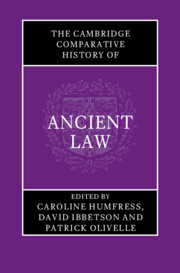(image source: CUPCUP)
Abstract:
The Cambridge Comparative History of Ancient Law is the first of its kind in the field of comparative ancient legal history. Written collaboratively by a dedicated team of international experts, each chapter offers a new framing and understanding of key legal concepts, practices and historical contexts across five major legal traditions of the ancient world. Stretching chronologically across more than three and a half millennia, from the earliest, very fragmentary, proto-cuneiform tablets (3200–3000 BCE) to the Tang Code of 652 CE, the volume challenges earlier comparative histories of ancient law / societies, at the same time as opening up new areas for future scholarship across a wealth of surviving ancient Near Eastern, Indian, Chinese, Greek and Roman primary source evidence. Topics covered include 'law as text', legal science, inter-polity relations, law and the state, law and religion, legal procedure, personal status and the family, crime, property and contract.
On the editors:
CAROLINE HUMFRESS is Professor of History and Co-Director of the Institute of Legal and Constitutional Research at the University of St Andrews, and an L. Bates Lea Global Professor of Law at the University of Michigan Law School. She is a Philip Leverhulme Prize winner and recipient of Il Premio della Corte Costituzionale della Reppublica Italiana (awarded by the Gérard Boulvert Society for the Study of European Civilization). She has published widely on ancient and early medieval law, rhetoric and forensic practice, and their intersections with modern scholarship; DAVID IBBETSON is Regius Professor Emeritus of Civil Law at the University of Cambridge and an Honorary Fellow of Clare Hall, where he was President from 2013 to 2020. He has published widely on the ways in which Roman law influenced (and continues to influence) English law, as well as the way in which Roman law related to other early legal systems; PATRICK OLIVELLE has been Chair of both the Department of Religious Studies at Indiana University, Bloomington, and of the Department of Asian Studies at the University of Texas. He has edited and translated seven early treatises on Indian law, including the Laws of Manu and the legal treatise of Yājñāvalkya. As the author of over thirty books, his works have won awards from the Association for Asian Studies and the American Academy of Religion.
Table of contents:
1. Orientation David Ibbetson
2. Law as text Michael Gagarin, Ernest Caldwell, David Ibbetson, Timothy Lubin, Geoffrey MacCormack, Joseph Manning and Martha T. Roth
3. Legal science Dario Mantovani, Ernest Caldwell, Sophie Demare-Lafont, Caroline Humfress, David Ibbetson, Geoffrey MacCormack, Patrick Olivelle, Robin Osborne, William Tooman, and Bruce Wells
4. War, peace and interstate relations Katelijn Vandorpe, Sophie Démare-Lafont, Geoffrey MacCormack, Mark McClish, Patrick Olivelle and Nicolas Wiater
5. Law and the state Mark McClish, Ari Bryen, Sophie Demare-Lafont, Geoffrey MacCormack and Robin Osborne
6. Law and religion Bruce Wells, Noah Bickart, Donald Davis, Edward Harris, Caroline Humfress, Geoffrey MacCormack, Robin Osborne and Katelijn Vandorpe
7. Legal procedure Patrick Olivelle, Michael Gagarin, Caroline Humfress, Geoffrey MacCormack, Joseph Manning and Bruce Wells
8. Status and family Timothy Lubin, Ari Bryen, Sophie Démare-Lafont, Michael Gagarin, Caroline Humfress, Geoffrey MacCormack and Joseph Manning
9. Crime, redress, and social control Ari Z. Bryen, Timothy Lubin, Geoffrey MacCormack and Robin Osborne
10. Property Joseph G. Manning, Edward Harris, David Ibbetson, Timothy Lubin and Geoffrey MacCormack
11. Commerce and contracts David Ibbetson, Ernest Caldwell, Edward Harris, Geoffrey MacCormack, Joe Manning and Patrick Olivelle
12. Conclusion Caroline Humfress.
Read more here (DOI 10.1017/9781009452243).


No comments:
Post a Comment
Note: Only a member of this blog may post a comment.